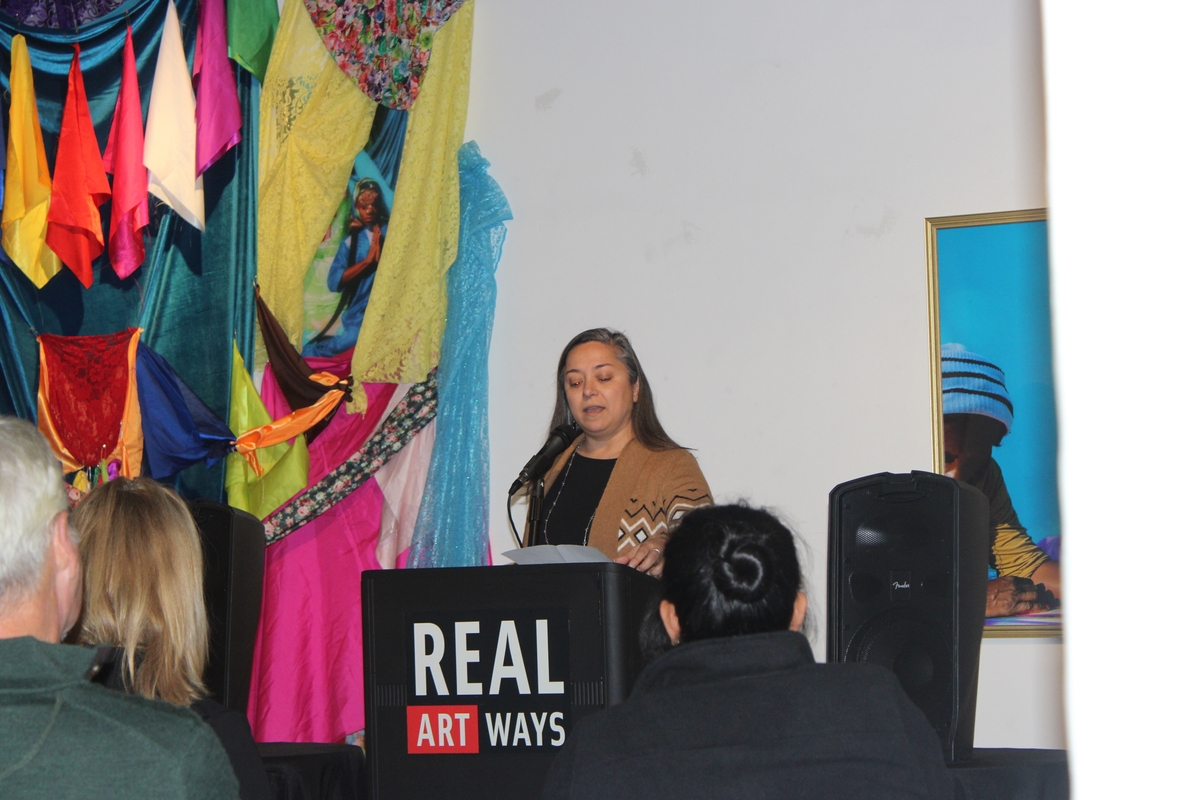Hartford
Death Be Not Cowed
by | Nov 9, 2023 1:47 pm
Post a Comment | E-mail the Author
Posted to: Spoken Word , Poetry

Becky Rodia-Schoenfeld reads "Houdini Debunks the Mystery of Me."
Riverfront Poetry Series
Real Art Ways
Hartford
Nov. 8, 2023
When one of my friends died during the pandemic, I couldn’t bring myself to go to his wake.
He was a paraprofessional, and the last time I’d seen him before he died he told me that he was signing up for a program to become a teacher. His wake was being held at his old school. It hurt too much to stand in the shadow of the building where he’d impacted so many lives, and was preparing to impact so many more.
I never grappled with that loss; I just let his memory fade away until it was dredged up Wednesday night at a Riverwood Poetry Series reading at Real Art Ways.
The theme of the reading was the aftermath of loss. It wasn’t advertised as such or even organized that way; the theme emerged on its own over the evening.
As cruel as it sounds, it’s possible to forget about a friend so that you can avoid the pain of their loss. But how can you forget about a child?

Julia Paul reads "Praise Poem."
During the open mic session of the evening, Julia Paul offered one answer: You can’t forget, so don’t even try. Instead, celebrate.
Her poem, “Praise Poem,” did exactly that: It praised her son. It didn’t moralize or justify. It declared that he lived a life worth praising for no other reason than he was her son.
How does one write down the life of someone so dear? That’s what poetry is. It allows the space for the audience to fill in the blanks. Because there’s no way that Julia Paul could tell me everything about what made her son special. What she told me, and how she told me, let me imagine the rest.

Charles Rafferty.
After the open mic, two featured poets read their works. The first was Charles Rafferty, who, aside from being an amateur mycologist, writes in format known as prose poetry. His poems read like short paragraphs, the introductory teaser of an essay that might be bursting at the seams but still a hell of a ride.
My favorite line of his, from the poem “Futility,” states the protagonist’s greatest fear:
I fear I’ll die as painfully as I deserve.

Robert Cording
Next was Robert Cording. Like Julia Paul, he lost a son. His poems were meditations on the years since, and how he and his wife have changed.
In “The Words We Speak,” Cording writes:
Sometimes when we speak about our grief,
The same words mean different things to us
There was no mistaking the pain in the eyes of parents who lost their children, even after so many years. Grief doesn’t come in stages, or even ebbs and flows. “You just get better at managing it,” Cording said between poems. Grief endures. But so does love.
I have to face the death of my friend. Not just acknowledge it, but really face it. Accept that his impact on the world will never be felt again. That I can’t ask him how teacher school is going. Pay attention to the void he left. It’s going to hurt. But when it’s over, I’ll be able to think about him again.
NEXT
Real Art Ways hosts The Silent Book Club on Nov. 15.
Jamil’s not sure what’s next, so stay tuned!